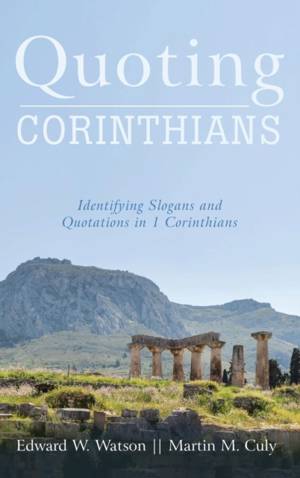
- Afhalen na 1 uur in een winkel met voorraad
- Gratis thuislevering in België vanaf € 30
- Ruim aanbod met 7 miljoen producten
- Afhalen na 1 uur in een winkel met voorraad
- Gratis thuislevering in België vanaf € 30
- Ruim aanbod met 7 miljoen producten
Zoeken
Quoting Corinthians
Identifying Slogans and Quotations in 1 Corinthians
Edward W Watson, Martin M Culy
Hardcover | Engels
€ 62,45
+ 124 punten
Uitvoering
Omschrijving
Imagine reading a letter where the writer is engaged in a heated debate with someone and repeatedly cites their positions, but never uses quotation marks to indicate that he is quoting them. This is precisely what we find in 1 Corinthians! Paul frequently quotes certain factions within the church and then proceeds to correct their faulty thinking; but he rarely explicitly tells us that he is quoting them. This poses a significant challenge for interpreters of this letter. How do we know when Paul is stating his own position rather than quoting a Corinthian position that he actually rejects? Quoting Corinthians sets forth a step-by-step process for evaluating potential quotations in the New Testament and then applies that process to eleven passages in 1 Corinthians where quotations may occur. As the first book-length attempt to establish more objective criteria for identifying quotations, Quoting Corinthians is a valuable resource for students and scholars alike who are seeking to rightly interpret the New Testament.
Specificaties
Betrokkenen
- Auteur(s):
- Uitgeverij:
Inhoud
- Aantal bladzijden:
- 162
- Taal:
- Engels
Eigenschappen
- Productcode (EAN):
- 9781532650277
- Verschijningsdatum:
- 12/12/2018
- Uitvoering:
- Hardcover
- Formaat:
- Genaaid
- Afmetingen:
- 152 mm x 229 mm
- Gewicht:
- 390 g

Alleen bij Standaard Boekhandel
+ 124 punten op je klantenkaart van Standaard Boekhandel
Beoordelingen
We publiceren alleen reviews die voldoen aan de voorwaarden voor reviews. Bekijk onze voorwaarden voor reviews.











